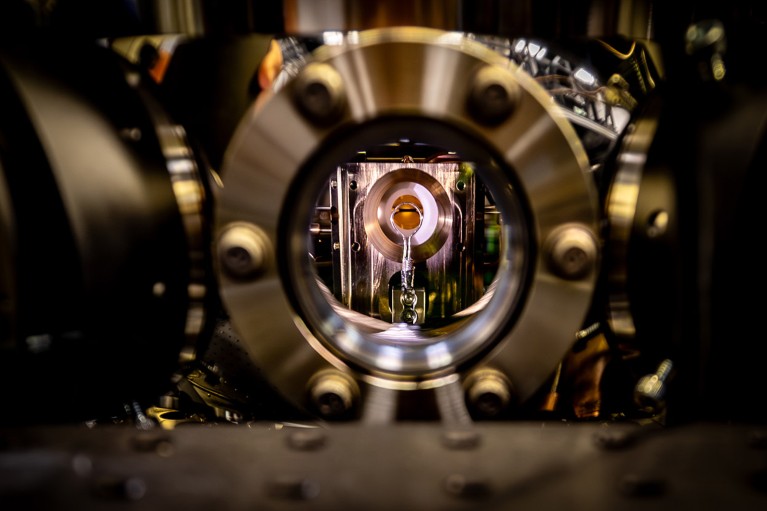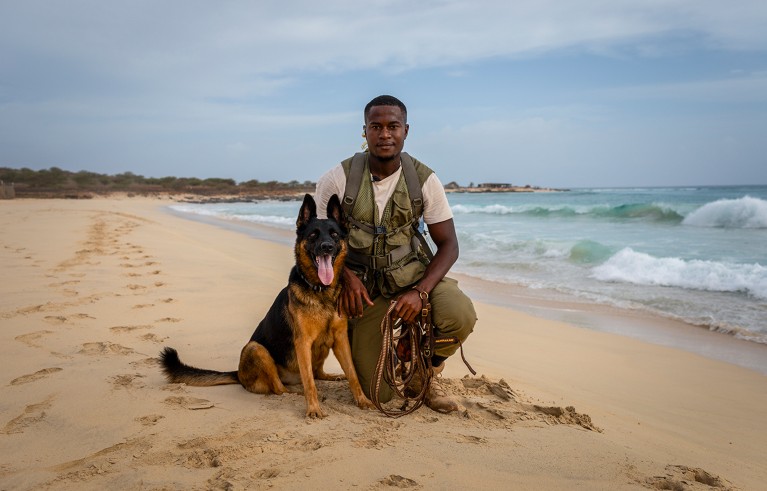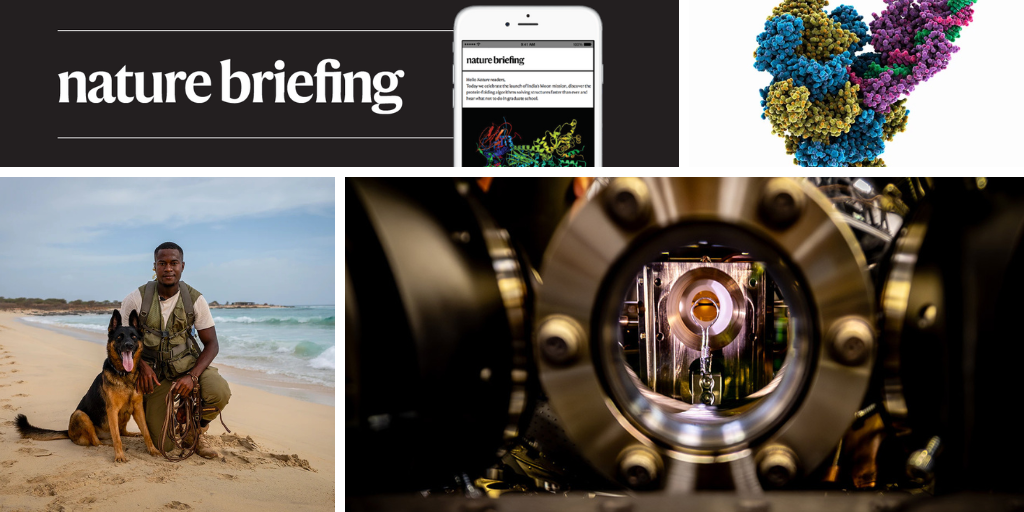You have full access to this article via your institution.
Hello Nature readers, would you like to get this Briefing in your inbox free every day? Sign up here.

Inside the trapped-ion quantum computer that carried out the chemistry simulation.Credit: The University of Sydney
A single atom has performed the first full quantum simulations of how certain molecules react to light. Researchers simulated the behaviour of three different organic molecules when they are hit with an energetic particle called a photon. They encoded these different parameters into a single ytterbium ion trapped in a vacuum using pulsating electric fields. The minimalistic approach could dramatically speed the path towards a ‘quantum advantage’, says the team behind the feat. “It is incredibly hardware-efficient,” says experimental quantum physicist Ting Rei Tan.
Reference: Journal of the American Chemical Society paper
A 41-year-old man has become the first person to receive a bladder transplant. Surgeons in the United States transplanted the bladder, together with a kidney, earlier this month, in an operation that lasted eight hours. “It’s the first time he has been able to pee in seven years. For all of us, this is huge,” says Inderbir Gill, one of the surgeons who performed the surgery. The transplant was the first of five planned as part of an early-stage clinical trial.
The New York Times | 8 min read
A new genome-editing tool promises to insert entire genes, precisely and efficiently, into human DNA. The method uses a bacterial enzyme complex called a CRISPR-associated transposase (CAST), which can introduce full-length genes at targeted sites in a single step, without creating double-stranded breaks in DNA. Researchers used directed evolution — a process that harnesses the power of Darwinian natural selection in the lab — to produce an optimized version of the enzyme complex, called evoCAST, that showed a more than 400-fold improvement in efficiency over the non-evolved original.
Features & opinion
Several researchers studying health inequities have had their grants from the US National Institutes of Health (NIH) cancelled because it related to diversity, equity and inclusion (DEI). The terminations have raised concerns about the extent to which research on health disparities will get swept up in the mass cuts to scientific research by the administration of US President Donald Trump. “It begs the question, what does DEI mean to the issuers of this notice? Does it mean the term ‘structural racism’? Does it mean ‘Black Americans’? Does it mean that we can no longer do rigorous science to really understand why the devastating burden of health disparities exist in this country and around the globe?” asks one affected researcher, nephrologist Dinushika Mohottige.
“Sapiocentrism” — the tendency to centre our world view around humans — could prevent us from grasping the importance of microorganisms to our planet’s future, argues science writer Peter Forbes in his book, Thinking Small and Large. Microbial technologies are key to restoring our planet and ensuring our survival in an era of ecological collapse, Forbes says, if we can overcome the political barriers to their use at scale. He “reminds readers that microbes weathered planetary upheavals long before humans arrived, and are likely to persist long after we are gone”, writes environmental scientist Raquel Peixoto in her review.
Five years on from the early COVID-19 pandemic, there is evidence that broad stay-at-home orders did protect public health — but that other measures can work just as well, if a country’s culture and resources make them possible to pull off. For example, by comparing Sweden (which did not enact strict lockdowns) with its neighbours Norway, Finland and Denmark (which did), researchers ultimately saw about the same level of excess deaths per capita, though spikes in death rates happened in different years. But there are no easy answers: ruthless contact tracing — which appears to have done the job, at least early on, in Taiwan — involved access to private data that many would find impractical and unethical. The real solution, say researchers, is to be better prepared so that pandemics don’t spiral out of control in the first place.
BBC Future | 18 min read (from March)
Where I work

João José Mendes de Oliveira is a dog trainer and handler at the Turtle Foundation in Sal Rei, Boa Vista Island, Cabo Verde.Credit: Luigi Avantaggiato for Nature
João José Mendes de Oliveira and Karetta, a five-year-old German Shepherd, work to stop turtle poachers in Sal Rei, in the Cabo Verde islands. “The illegal hunters usually leave something behind — a piece of clothing, or even a footprint,” says Mendes de Oliveira. “The dog can smell that evidence and lead law-enforcement officers to the poacher.” Their efforts are working, he says, but there’s more work to do. “Although poaching has been reduced, many turtles are injured or killed owing to sea pollution such as fish lines and fishing nets.” (Nature | 3 min read)
On Friday, Leif Penguinson was making friends with the wild goats in the foothills of the Zagros Mountains in Iran. Did you find the penguin? When you’re ready, here’s the answer.
Thanks for reading,
Flora Graham, senior editor, Nature Briefing
With contributions by Jacob Smith and Smriti Mallapaty
Want more? Sign up to our other free Nature Briefing newsletters:
• Nature Briefing: Careers — insights, advice and award-winning journalism to help you optimize your working life
• Nature Briefing: Microbiology — the most abundant living entities on our planet — microorganisms — and the role they play in health, the environment and food systems
• Nature Briefing: Anthropocene — climate change, biodiversity, sustainability and geoengineering
• Nature Briefing: AI & Robotics — 100% written by humans, of course
• Nature Briefing: Cancer — a weekly newsletter written with cancer researchers in mind
• Nature Briefing: Translational Research — covers biotechnology, drug discovery and pharma


